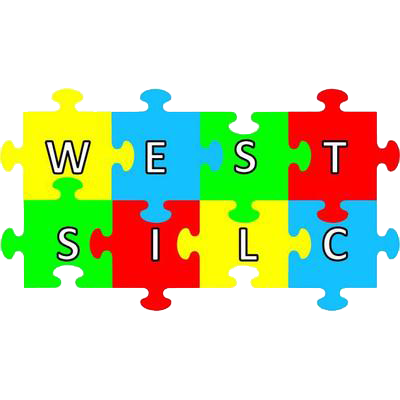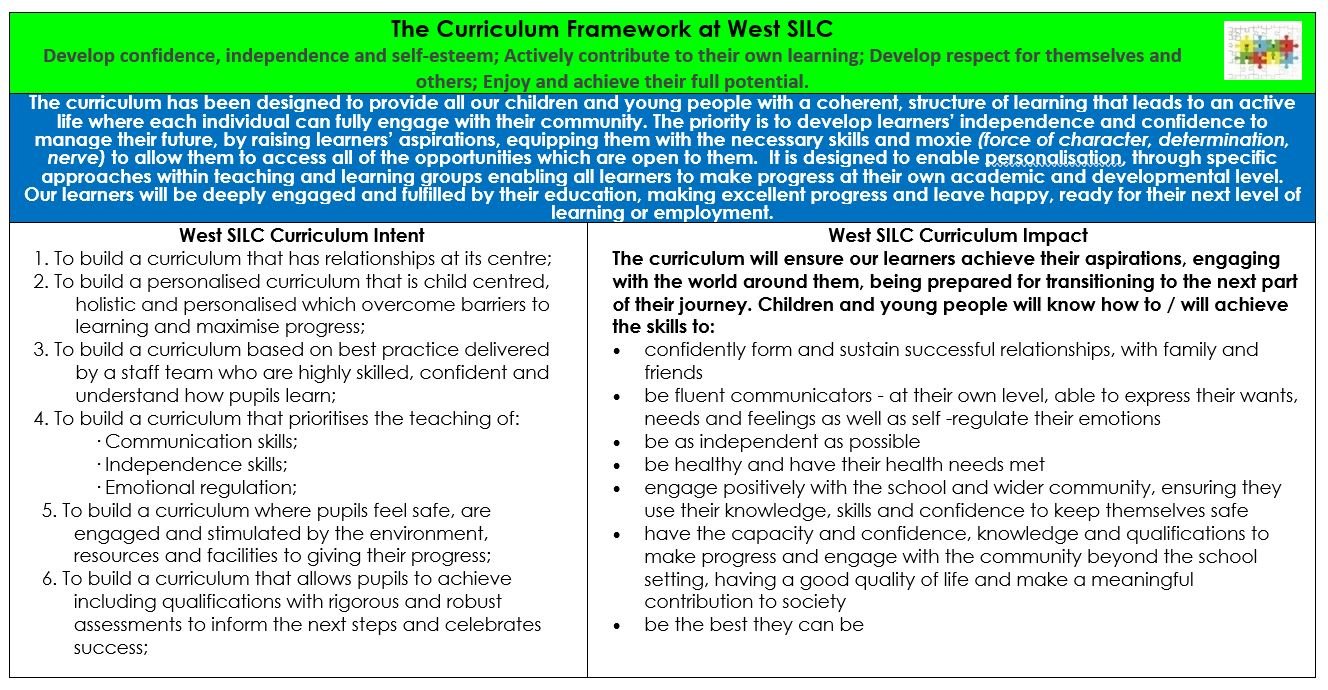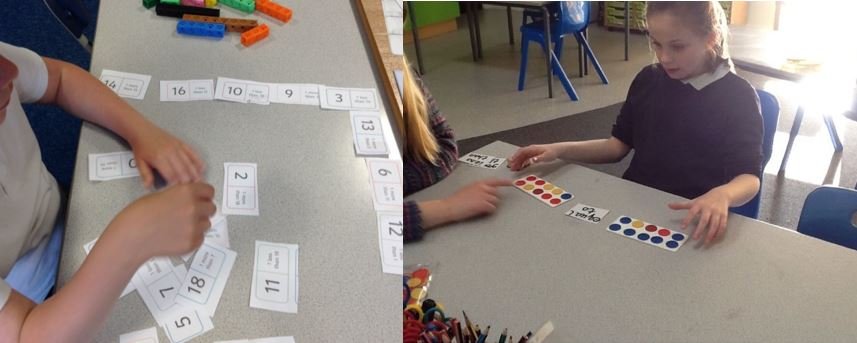
Maths @ West SILC
Maths teaches young people how to make sense of the world around them by developing their ability to calculate, to reason and to solve problems. It enables learners to understand and appreciate relationships and patterns in both number and space in their everyday lives. By learning to communicate and apply mathematical ideas and concepts, learners become equipped with the tools to tackle a range of practical tasks and real-life problems. Maths is delivered at West SILC as both a discrete subject and through a cross curricular approach, adapted from the White Rose scheme of work, which West SILC has broken down into smaller steps to make it more accessible for our learners. It is taught using the concrete, pictorial and abstract approaches to develop Maths Mastery. Using this method learners are introduced to an idea or a skill by acting it out with concrete resources. As number underpins almost every area of mathematics, without this conceptual understanding being thoroughly embedded, our learners have a huge barrier to progress and are likely to struggle in Mathematical understanding. The teaching and embedding of number is therefore fundamental for our learners. Our learners need to become fully numerate to help them maximise their contribution to society, be as independent as they can be and move towards meaningful life-long employment.
Planning, learning and assessment is guided by the National Curriculum but differentiated to support our learners.
Learners will:
develop confidence and competence within all areas of Maths – number, number systems, shape
enjoy Maths and be motivated to learn
understand the importance of Maths in everyday life and apply the skills they learn in a meaningful way
HOW IS maths DELIVERED ACROSS OUR PATHWAYS?
Informal Curriculum - CMLN
The majority of students with CMLN are learning at levels that make subject specific learning inappropriate therefore they do not access a maths curriculum. Some students may have physical, medical or multisensory barriers to learning that make it appropriate for them to be placed within CMLN setting but who are able to develop some basic functional numeracy skills, this is planned for on an individual and highly personalised basis.
Informal Curriculum - CCA
Many of our pupils demonstrate 'spiky profiles' where their Maths and English skills are more advanced than their core skills. We differentiate the learning for these pupils to ensure they don't lose skills they have developed but are still able to make progress. We absolutely promote high levels of progress for all learners and value adult led focused learning where appropriate without losing sight of individual needs. In CCA we use a developmentally and age appropriate curriculum to facilitate deep and active learning. All pupils are working below year 1 expectations so we follow the EYFS (Early Years Foundation Stage) good practice documents to ensure the curriculum meets the needs of the pupils. Maths learning is embedded within the enhanced provision for all pupils to access at their level. Staff use play schemas to develop learning and progress through planning activities that engage and excite each individual student. Life skills sessions are used to provide opportunities to use maths in everyday contexts. Cooking, baking, trips to the shops (using money etc.) allow our pupils to have access to the maths skills that they need to be able to function more independently throughout their life.
Semi-Formal Curriculum
Mathematical development covers the early stages of understanding ways to apply maths in the environment, number concepts and calculations and an understanding of shape, space and measures. Mathematical understanding covers awareness of, and observation of patterns in the environment and the ability to collect and organise information. Maths lessons are planned through adapting The White Rose maths scheme. Our pupils need to make sense of numbers, time, patterns and shapes. Their development in their mastery of these areas is supported through the curriculum with additional activities such as cooking, shopping and life skills activities.
Formal Curriculum - Priesthorpe
Partnership students have 8 lessons of Maths per fortnight and KS3 students have two additional Numeracy lessons. In the teaching of Maths, there is a focus on a Mastery approach to learning to promote our pupils understanding of all strands of Maths. Maths topics are taught using an in- depth approach; beginning with a kinaesthetic highly hands on use of manipulatives (like counters, blocks, bricks and Cuisenaire Rods) to learning more formal methods of written calculation methods and using and applying these skills to real-life worded situations. Engagement with new topics and the practicing of new skills is promoted with the use of games, quizzes, computer programmes and whole class discussions alongside the more formal learning and written work pupils are expected to complete.
Partnership pupils arrive into Key Stage 3 with highly differentiated prior abilities in all areas of Maths and numeracy and their lessons are always tailored to ensure that every pupil is challenged and makes progress. Key skills that are needed across most Maths topics are reinforced for the first ten minutes of every lesson so pupils can practice and improve on these daily. Alongside their class learning, pupils have a home learning worksheet, which is minimally different every week. This offers West SILC pupils a chance to practice and revisit skills independently (or with the teachers/parents/carers help) and is aimed at improving our pupil’s confidence with key skills and consolidating their understanding. This ensures pupils do not forget their prior learning of topics like time and money and can begin to make links in their understanding across all the different branches of maths.
Pupils spend extended periods of time on the different areas of Maths such as place value, calculations, money and time and they are beginning to incorporate their Entry Level qualification in Mathematics, into these areas. Some pupils have the opportunity to complete much of their Entry Level 2 and Entry Level 3 Qualification in Year 7 and Year 8. This offers these more confident maths students in Partnership to follow an adapted Key Stage 4, three-year GCSE Curriculum beginning in Year 9 like the mainstream pupils at Co-op Academy Priesthorpe. The few Partnership pupils (for whom GCSE Mathematics is not appropriate) will spend Key Stage 4 reinforcing their understanding and building on their Key Stage 3 learning to maximise their Entry Level Qualification grade, build on their mathematics knowledge and their understanding of key life skills like telling the time, understanding and recognising the value of money, reading timetables, estimating and measuring.
The focus for all of our Partnership pupils is that they will all participate and enjoy their Numeracy and Maths lessons and leave this setting confident in the basic numeracy skills they will require in life. Alongside the more formal lessons in Maths, other areas of the Partnership curriculum will further reinforce and build on the pupils’ numeracy life skills. Partnership pupils will be able to gain practical experience to put these valuable skills into practice with the many trips and outings offered in their life skills lessons.
FORMal curriculum Post 16
Poor numeracy can encourage our learners to display their anxieties towards numeracy negatively. We make sure they have no need to feel nervous by offering daily opportunities to engage at various levels, with dynamically responsive support. As numeracy assessments increasingly become part of recruitment processes the absence of mathematical confidence can inhibit a person’s progression. In class numeracy skills are developed in a range of settings from the formal Maths lessons to being able to apply these skills on a daily basis. In Kitchen sessions pupils deal with numbers when following recipes, measuring quantities and working with time. In classroom-based lessons pupils follow the functional skills approach covering numbers, shapes, time and money. Mastery of these areas is supported through the curriculum with additional activities such as cooking, shopping and even playing sport. Pupils are challenged to tell the time on a daily basis when working through the daily timetable. Money is covered both in lessons and when using the rewards system in class where positive and negative behaviour equates to a monetary amount which is then counted out using money and saved to earn prizes on a termly basis. This reward system also introduces pupils to key terms such as tax, fines, and deposits as well as credit and debit. Pupils can ‘bank’ amounts they have earnt into a college bank account.
Formal Curriculum - AIP
The maths curriculum is designed to help learners to become fluent in the fundamentals of mathematics to enable pupils to develop their conceptual understanding and their ability to recall and apply knowledge and skills. Our students are taught mathematics five times a week. Teaching of mathematics focuses on the application of the mastery approach to learning. Our curriculum in mathematics is promoted by application to real-life situations, playing games, virtual learning environments such as Maths Box, My Maths, and Class VR. We also have regular quizzes and class discussions. Students are taught number, ratio & proportion, algebra, geometry & measures, probability and statistics with special emphasis on application and problem solving by applying their mathematics knowledge and skills to a variety of routine and non-routine problems. Students are assessed on entry using the Access Mathematics Test (AMT) to determine their mathematics age and appropriate curriculum. We offer GCSE (Foundation and Higher tiers) and Entry Level AQA and NCFE Functional skills qualifications. Lessons are tailored to ensure that the curriculum meets the individual needs and ability of the learner and that students can be challenged and make meaningful progress. For students for whom the GCSE may not be appropriate, they spend KS4 reinforcing their understanding of maths skills such as knowledge of numbers, calculation skills, money, time, interpreting mathematical information, shapes, measurement and data handling.










